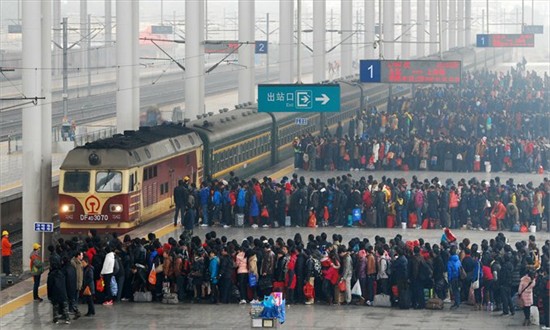
Transportation authorities geared up for another Spring Festival travel rush, as millions of people finished their week-long holidays.
The Ministry of Railways (MOR) said it organized 815 additional trains yesterday to cope with the increased passenger flow, up from 672 Friday, when more than 5.8 million passenger trips were made on railways.
More passengers have chosen trains due to continued precipitation in southern regions, putting more pressure on rail services, the ministry said.
The National Meteorological Center (NMC) said the weather conditions would bring some problems for the post-holiday travel rush in the next three days.
"Until tomorrow, the majority of precipitation is expected in southern China. The central and western parts of Guizhou Province will see freezing rain. In central and eastern China, temperatures are expected to fall by 4-6 C due to cold air," the NMC forecasted.
He Jianzhong, a spokesman for the Ministry of Transport (MOT), said Friday that snow and rain in southern regions are not likely to have a serious impact on road travel in the coming days.
The Spring Festival, which fell on Monday this year, is the most important Chinese holidays for family reunions, making it a hectic time for the country's public transportation system.
Data from the MOR yesterday showed that tickets to big cities such as Beijing, Shanghai and Guangzhou were almost sold out. The situation would ease a little in the coming week.
More than 104.8 million passenger trips had been made on railways during this year's chunyun, which started January 8 and will end on February 16, up 5.1 percent year-on-year.
Meanwhile, a total of 40.91 million road trips had been made on highways as of Thursday - up 9.8 percent from the same period last year, the MOT said.
For the aviation sector, the Civil Aviation Administration of China had estimated that 34.88 million passenger trips would be made during the chunyun, up 7 percent year-on-year.
A staff member with the news center of the Beijing Capital International Airport told the Global Times that the airport saw some 1,500 flights take off and land yesterday, with around 240,000 passengers on board.
"The airport is operating normally," he said.
Besides public transportation, people are also looking for alternatives to travel back.
Wang Yong, secretary-general of the Brand China Industry Union, who has been offering free rides to commuters for the past 14 years in Beijing, started a campaign online to organize free carpooling services during the holidays.
Wang and four celebrities called on people who are willing to take on extra passengers to post their time of departure, routes and available seats online, so that other travelers could request a free ride. The organizers also asked both sides to sign contracts for the carpooling.
Wang told the Global Times that the difficulties in securing train tickets during the holiday prompted the idea.
According to Wang, more than 12,000 people joined the campaign before the Spring Festival, and at least 300 drivers offered more than 700 people free rides.
"We started the second round of the campaign on Thursday, helping people to find their partners for the post-festival travel rush. A lot of people answered the call on Friday," Wang said.
The holidays also saw tourism flourish, the National Holiday Tourism Office said yesterday.
According to the office, Chongqing received nearly 21.8 million tourists during the holiday, up 43.76 percent year-on-year.
The city's tourism revenue reached more than 5.4 billion yuan ($860 million), a hike of 45.33 percent over the same period of last year.
In Shanghai, tourists spent an average of 943 yuan during the holidays, up 7 percent year-on-year, with 44 percent of the money spent on shopping.
The number of outbound tourists also saw a significant rise. The office said as of Friday morning, 140,000 tourists left the country from Shanghai, a rise of 20 percent year-on-year.
Meanwhile, as the holidays ended, some people said they were reluctant to go back to work.
"During the festival, I was busy visiting my relatives and friends. I was even more exhausted than when I'm working. I'm just waiting for the next holiday," Wang Jing, 23, an office worker in Beijing, told the Global Times.
Analysts say that many people would feel fatigue, nervousness or even suffer from insomnia after they get back to work from holidays, and suggest they relax, make a daily schedule and do more exercise.
Xinhua contributed to this story

Copyright ©1999-2011 Chinanews.com. All rights reserved.
Reproduction in whole or in part without permission is prohibited.